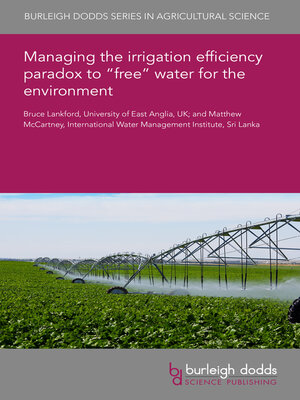Managing the Irrigation Efficiency Paradox to Free Water for the Environment
ebook ∣ Burleigh Dodds Series in Agricultural Science
By Professor Bruce Lankford

Sign up to save your library
With an OverDrive account, you can save your favorite libraries for at-a-glance information about availability. Find out more about OverDrive accounts.
Find this title in Libby, the library reading app by OverDrive.



Search for a digital library with this title
Title found at these libraries:
| Library Name | Distance |
|---|---|
| Loading... |
Reducing water consumption (equivalent to depletion) in irrigated agriculture 'saves' water, freeing it up to be allocated to other sectors, for example, to restore environmental flows. However, this task is not straightforward because consumption is difficult to adjust; there are many scales, motives, actors, concepts, calculations and hydrological practices and processes involved. Without a comprehensive approach to managing water, attempts to save water typically result in no observed effect, a reduction in crop production, a redistribution of water, or, paradoxically, an increase in water consumption. To address this challenge, a six-part 'irrigation savings allocation framework' (ISAF) to effect consumption-based savings is proposed. It first considers crop water requirements, then field applications, through to intra-system, and then system withdrawals of water. ISAF controls for irrigation consumption rebound and reuse in order to reduce depletion at the basin scale, and it tracks 'freed up' water to ensure it can be allocated to nature or other sectors.







